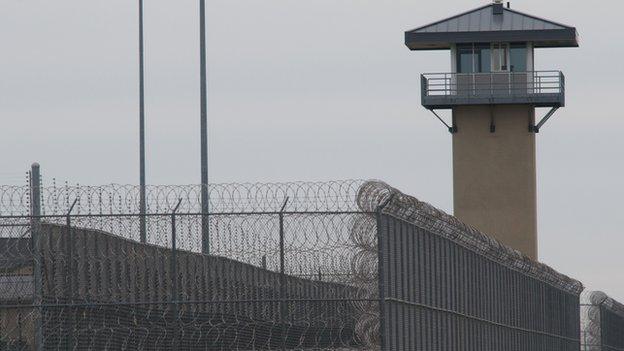Report: US prison rates an 'injustice'
- Published
- comments

Incarceration rates have increased dramatically in the US over the past four decades
Since the 1970s the rate of incarceration in the United States has quadrupled, after having been relatively flat over the prior half-century.
In 1973 the number of Americans in prison was around 200,000. By 2009 that number had grown to 1.5 million. An additional 750,000 Americans are held daily in local jails.
These are the findings of a report, external released this week from the National Research Council (NRC). The US is the world's top jailor, the report finds, and the numbers aren't even close:
The US penal population of 2.2 million adults is the largest in the world. In 2012, close to 25% of the world's prisoners were held in American prisons, although the United States accounts for about 5% of the world's population. The US rate of incarceration, with nearly 1 of every 100 adults in prison or jail, is 5- to 10-times higher than rates in Western Europe and other democracies.
Based on the results of its study, the NRC calls the US incarceration rates "historically unprecedented and internationally unique".
The report also paints a picture of the kind of people who are filling US prisons and jails. More than half are black or Hispanic and come from "the most disadvantaged segments of the population".
They are mainly men under age 40, who are poorly educated and often have drug and alcohol addiction or other medical issues.
Another disturbing fact: a black man under the age of 35 who did not graduate from high school has a greater chance of being in prison than in the workforce.
The report concludes:
The meaning and consequences of this new reality cannot be separated from issues of social inequality and the quality of citizenship of the nation's racial and ethnic minorities.
"Prisoners are more likely to come out of poor communities (and to return to them)," writes, external the Washington Post's Emily Badger. "This means that communities with the least capacity to absorb former prisoners are home to the largest share of them. This also means that economic, social and political problems tied to incarceration tend to fall on communities that have many other related challenges."
But have the increased incarceration rates made Americans safer?
The report finds that the crime rates have fluctuated over the past 40 years, and while they have declined overall, there is little correlation to the rise in sentencing rates.
"The tremendous increase in incarceration in the US does not reflect the fact that the country has become substantially more criminal or violent over this time," Badger says. "The true explanation has more to do with politics and policy."
The war on drugs, mandatory minimum sentences and politicians promising to "get tough" on crime - these are the driving forces behind the incarceration numbers, the report asserts.
"How did that happen?" asks, external Reason Magazine's Jacob Sullum. "In brief, American voters and politicians freaked out about crime, demanding ever-tougher policies that increased the likelihood and length of incarceration."
Although the arrest-to-crime ratio has remained largely the same over the past four decades, it has become much more likely that those arrested wind up in prison.
Prosecutions have become more effective, and many more convicted criminals never stand trial - they plead guilty to a lesser charge and a shorter sentence.
"This makes it much easier for prosecutors to move cases through the courts," writes, external Vox's Dara Lind. "Of course, efficiency isn't necessarily the same as effectiveness - in theory, the point of prosecution should be to figure out whether the person committed a crime or not, not to convict and sentence as many people as possible."
Then there's the high costs of incarceration. Corrections budgets are the third-largest item in most states, behind health care for the poor (Medicaid) and education. In 1972 state spending was $6.7b (£4b). By 2010, it had grown to $53.2b - from 1.9% to 3.3% of overall state budgets.
"Corrections budgets have skyrocketed at a time when spending for other key social services and government programs has slowed or contracted," the report says.
After looking at the data, the report's authors conclude that reforms must be made - sentences should be shorter for non-violent criminals and prison conditions should be improved so inmates are better prepared to re-enter society.
"We believe that the policies leading to high incarceration rates are not serving the country well," the report states. "We are concerned that the United States has gone past the point where the numbers of people in prison can be justified by social benefits. Indeed, we believe that the high rates of incarceration themselves constitute a source of injustice and, possibly, social harm."
The report, Sullum writes, "can be used to win over anyone who still thinks building more prisons is a sound investment in public safety".
David Downs of the East Bay Express puts it a little more forcefully, external:
Congrats, fellow Americans. We did it. Like mastering the atom, or walking on the moon, we've succeeded where others have come up short. We've put more people in more cages than any country ever in the history of the Earth. Land of the free, indeed!